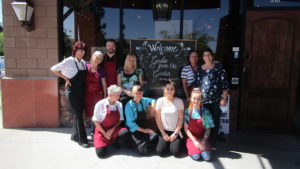Area establishments credit SBA funds and loyal customers for easing the economic impact of the pandemic.
In early May, Arizona Congressman Tom O’Halleran announced that the Small Business Administration’s $28.6 billion Restaurant Revitalization Fund had begun accepting applications. Many restaurants in Central and Northern Arizona have either already received or applied for these funds.
Priority for the first 21 days was given to restaurants owned by women, veterans or groups that are socially or economically disadvantaged. Rep. O’Halleran issued a statement acknowledging that independent restaurants are important to their communities, but many are at risk of closing their doors because of the pandemic.
Restaurant owners can find information and apply to the Restaurant Revitalization program at sba.gov/funding-programs/loans/covid-19-relief-options/restaurant-revitalization-fund.
Lisa Dahl, CEO and chef at Dahl Restaurant Group, said it has been a challenging time for her five Sedona restaurants. “Because our core group is strong, we put our heads together to strategize each and every move. The large picture is complex and involves everything from forecasting, supply chain issues and seeking a qualified workforce,” she said.
The Dahl Restaurant Group operates Dahl & Di Luca Ristorante Italiano, Mariposa Latin Inspired Grill, Pisa Lisa, Butterfly Burger and Cucina Rustica Tuscan Grill. Dahl said she’s never experienced anything like this, where one day they would be open and the next day they would be closed.
“After 25 years in the restaurant business, I have to say it is very different. The new normal is being hyper-focused on the health of our employees and guests,” she said. “The past workflow of preparing to welcome guests has changed. The emotions for everyone run deep. And we see guests crack and employees need a day off more than usual. Everyone has changed as a result of COVID. Normal is redefining itself before our eyes.”
The Dahl Restaurant Group was able to obtain funds from the SBA for restaurant revitalization. During the pandemic, Dahl said, they had to spend more money on signage, sanitation stations and supplies like masks and gloves. “In a few instances, we’ve added additional guest relations [services] so we can communicate effectively and help set guest expectations,” she said.
Her goals throughout the pandemic included keeping employees safe, well advised and realistic about expectations through changing circumstances. “Our guests during each stage were complimentary. And most appreciated our preventative measures which we took to safeguard their health and ours,” she said.
The new normal that is likely to continue may include smaller numbers of guests. “I’ve always been vigilant about quality control, consistency and cleanliness. Our staff has focused on these standards and I am very proud of them. We always had a strong culinary presence, but it has been a challenge with a reduced workforce. We will continue to improve through this process. Part of our early strategy was to build back stronger and be more efficient with better training,” she said.
Kelly Hanseth, owner of Lumberyard Tap Room and Grille, said it was a struggle during the pandemic because the establishment had to pivot every six months. “We’re almost getting back to normal. Social distancing and expanding our patio has really helped,” she said. “But we’re not at 100%. We have no bar seating and our country dancing is not back up to speed yet.”
Lumberyard Tap Room and Grille did not apply for the most recent round of SBA funds, as Hanseth says they are not needed at this time. Although, she says the Lumberyard had to spend more during the pandemic because of the need for plexiglass partitions, masks and gloves. Small pivots have large impacts. For example, she says it costs more to buy ketchup packets rather than ketchup bottles.
In the last year, the Lumberyard saw a lot of new customers as the regulars kept coming. The restaurant offered take-out through much of the pandemic. With the restaurant back to full service, customers were lining up again outside on a recent Saturday, waiting to get in. “We’re really happy with how patient our customers have been,” she said. “We still wear masks, gloves and practice social distancing.”
Goods from the Garden at the Gateway Mall in Prescott offers catering services, take out, dine-in service and a Sunday brunch. Co-owner Debbie Maranville said they lost most of their catering events during the pandemic. “We’re not normal yet, but we’re regrowing,” she said.
Goods from the Garden has received SBA grants to help the business through the pandemic, which, like other restaurants, required more spending for supplies and additional labor to serve fewer customers because of social distancing rules.
“Amazing” is how she describes her customers during the pandemic. “Customers were very supportive. They would get weekly meals from us. Some used social media to get the word out.” QCBN
By Stan Bindell, QCBN






Leave a Reply